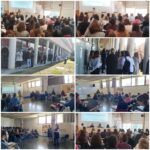Intellectual Output 1 (IO1) – Handbook on evidence informed practices for school inclusion
Download Infographic (ENGLISH)
Download Infographic (CATALAN)
IO1 represents a systematization of a set of criteria, indicators and standards of the evidence informed practices (EIP) for teachers, school leaders and policymakers. The aim of the IO is to understand why teachers do or do not engage with research evidence in their school practice and this data will be pulled out in a database will complement the state of the art and the literature review realized before the project starts.
Target groups: Each partner will conduct an in depth study in their context, involving teachers, school leaders and policymakers, with the aim to contextualize:
– The use schools make of research in their practice.
– The use of research evidence in dealing with diversity.
– The understanding of the educational research in context of diversity.
– How schools use research evidence to facilitate pupils’ inclusion at class and school level.
The database will set the basis for the next IO and will give valuable information on how:
– Teachers perceive the benefits, costs and significance of research evidence.
– How teachers engage with research evidence.
– How teachers address pupils’ diversity through the use of research evidence.
– Research evidence is use to address pupils outcomes.
The IO consists in a development of a survey in which we explore the perceptions of primary school teachers and school leaders in relation to the costs, benefits and signification aspects of engaging with research evidence, as well as identified behaviors in terms of research use. Such a survey has not been undertaken before, which means there is the potential here for it to provide much novel information.
The innovative character of the IO is due to the fact that:
– It will provide for the first time a coherent list of criteria and indicators for ERIP in high complexity schools.
– The data will be reached using the principle of semiotics. Semiotics has a key role to play in relation to research informed practice because what is signified to us by particular ideas, objects, people etc. is instrumental to how we make choices. And understanding how we make choices is widely regarded as key to understanding how we might enact behavioral change.
The database of criteria, indicators and standards will lead to stage two of the project: product development of 360º intervention designed to encourage
teachers to engage with research evidence. As such, the aim is to use the findings to create a practical user-focused product that, itself, has impact. In addition, we envisage that the findings of the survey will have significant academic, policy-related practitioner significance. Specifically, they will inform those who undertake research into research use: providing a novel theoretical perspective and international findings on the perceptions of teachers in relation to research use in high complexity schools contexts. At a policy level, this work will also help policy-makers identify relevant policy levers available to them if they wish to ensure research-informed practice becomes a reality in their schools and school system.
Intellectual Output 2 (IO2) – Open Digital Platform (ODP) for Evidence-informed practice for inclusion
Please visit the outcome of this IO – ODP by clicking on this link here.
Download infographic (ENGLISH)
Download Infographic (CATALAN)
The IO forms part of the 360º intervention plan and is based on the existing knowledge and IO1. The challenge for this intellectual output is to find a way to democratize knowledge, through the use of modern technology, and to transform schools by empowering teachers and school leaders to use innovative approaches in classrooms accessing and using validated and quality sources of information to support their decisions. In addition, this IO aims to design an Open Digital Platform with resources for the reduction of the gap between advantaged and disadvantaged pupils outcomes through the promotion of a research evidence informed practice. We will tackle this challenge by focusing on target group and facilitating the possibility of online knowledge sharing, collaboration and co-creation. After a systematic literature review on the use of evidence based teaching practices and teachers’ needs in school education, we identified several difficulties faced by teachers and school leaders to access quality information about the best educational practices to address diversity in classrooms. Data of the existing research will be complemented with data systematized in the data base comprised in the IO1.
In addition, it was found that online resources are the first option for teachers and school leaders when looking for information. However, not always
these resources are trusted and not all the resources on the Internet are validated and reliable based on contrasted research. The project prototype will fill this gap and will provide evidence and research based examples, materials and solutions to address classroom diversity and specific learning problems.
Target groups: Primary and secondary teachers, school leaders, policy makers.
The Open Digital Platform has several elements of innovation. First of all, it aims for an open access community by any person with internet access. In addition, we will follow a user-center approach with the creation of “personas” that reflect the needs, actual behavior, goals and motivation of teachers, school leaders and policy makers. Since our emphasis lays on the user experience, we want visitors to fully empathize with prospective users, so will design a digital game for visitors to experience the digital platform. Visitors will pick which user role (persona) they want to explore and they will experience the features of our community through simple tasks.
The methodology used will be the co-creation of the resource. In addition, it is important to mention that we are committed to integrate in all our activities the United Nations Sustainable Development Goals (SDGs) for 2030. This intellectual output is directly linked to SDG 4 (Quality Education) and SDG 17 (Partnerships for the Goals). An interdisciplinary team formed by researchers and school practitioners and policymakers involved in school development will work on the preparation of the prototype, aiming to explore different perspectives on the design challenge, looking at it from the viewpoint of different disciplines and stakeholders and target groups (type of classrooms diversity, composition of target groups).
The content of the platform is extremely relevant to all school teachers, school leaders and policy makers, and might become a major inspiration for technologists to materialize it.
The design thinking process we will follow consists of 4 stages:
- What is? This stage is related to research and redefinition of the challenge. It is about assessing and understanding the context and the current state,
identifying the key players and the potential users as well as the relationships and the system the challenge operates in. The outcome of this stage is often a new, clearer definition of the challenge and design criteria that have to be fulfilled by the proposed solution to REIP for inclusive schools. - What if? This stage is about generating a number of ideas and possible solutions in a wide variety of proposals and perspectives, scopes and resources. The outcome of this stage is a big amount of ideas that could offer a solution to the REIP for inclusive schools.
- What wows? This stage is about reflecting back on all the generated ideas from the perspective of the design criteria and limitations identified in the first stage and picking out a few ideas which seem to have great potential. The outcome of this stage is usually a short list of ideas that can be tested and prototyped and that all reflect the design criteria of REIP for inclusive schools.
- What works? This stage is about fast prototyping and testing as many ideas as possible in a short amount of time with minimal resources. It helps us learn about the effects and impact of different solutions and helps us to learn more about the challenge through experimentation and make quick iterations before we invest a lot of resources in a fully developed solution. The outcome of this stage are usually prototypes, experiments, hypotheses, new insights about the challenge and often new design criteria for the REIP for inclusive schools.
This process, although presented in a linear way, is both iterative and fractal. Once the prototype is finalized, it will be developed technically by full stack developers.

Intellectual Output 3 (IO3) – Training plan for teachers, school leaders and authorities on evidence informed practice for inclusion
Download Infographic (ENGLISH)
Download Infographic (CATALAN)
Download training materials (in various languages)
To register for the training (in various languages):
Training on Evidence-Informed Practice for School Inclusion (EIPSI)
Formación en prácticas informadas en la evidencia para la inclusión escolar (EIPSI)
FORMACIÓ SOBRE PRÀCTIQUES INFORMADES EN EVIDÈNCIES PER A LA INCLUSIÓ ESCOLAR
Formare în domeniul practicilor bazate pe dovezi pentru incluziune școlară (EIPSI)
Training over sociale integratie in het onderwijs met behulp van wetenschappelijke methoden
This IO aims to build the capacity of teachers, policymakers and local stakeholder to implement EIPA in high complexity schools.
This objective will be achieved through the provision of course materials and training plan.
The IO will provide:
– Training materials and content (face to face and online).
– Training guidelines and methodology for implementation, including guidelines for autonomous implementation in schools.
– Assessment criteria for teachers and school leaders to identify and tackle inequalities between students’ outcomes in diverse classrooms.
The materials will include readings, examples of good practices, role-play exercises, case studies, videos and evaluation methodologies.
Target groups: Each partner will select high complexity schools in their region and a sample of public administration representatives, policymakers and other stakeholders dealing with diversity in schools. In each school and each public administration/ associate institution will be selected a “Impulse Group” formed by those teachers which will be trained and will be the school “champions” and promoters of REIPA in their institution.
The approach is based on both face to face and blended learning approach ensuring the easy access to training materials through the platform developed in IO2, networking between professional form all countries involved in the project which will ensure the European dimension of the training and exchange of knowledge, and complementary approach because in each country the classroom diversity have local characteristics and specifics and as consequence different approaches.
The methodology used is innovative, since the training will use the Research Learning Network (RLN) approach to training teachers on how to employ the pilot research-use intervention effectively. RLNs were originally conceived as a means to support the implementation of research-informed practice at scale (Brown, 2015), and due to its efficiency, this method will be applied to apply REIPA in diverse classrooms.

Intellectual Output 4 (IO4) – School development and coaching plan for Evidence-Informed Practice (EIP)
It has been acknowledged that evidence-informed practices may lead schools to improved practices, student learning and organizational improvement. Building upon the RNL training for teachers, additional support will be offered to schools in order to develop evidences informed practices at school level. IO4 will contribute to build the capacity of teachers, policymakers and local stakeholders to implement evidence-informed practices for inclusion (EIPI) in high complexity schools.
The IO will provide:
– A coaching plan to support school leaders in the implementation of REIPA in diverse schools (ENGLISH, DUTCH , CATALAN, SPANISH, SLOVENIAN, ROMANIAN)
– A guideline for the implementation of EIPA in schools (ENGLISH, DUTCH, CATALAN, SPANISH, SLOVENIAN, ROMANIAN)
– An implementation plan to be used autonomously for school leaders in diverse schools (ENGLISH, DUTCH, CATALAN, SPANISH, SLOVENIAN, ROMANIAN)
– An assessment tool to assess the engagement of school with REIPA (ENGLISH, DUTCH, CATALAN, SPANISH, SLOVENIAN, ROMANIAN)
– Resources/ materials and tools to support leaders in the creation of a favourable school climate for the EIPI (ENGLISH, DUTCH, CATALAN, SPANISH, ROMANIAN)
Target groups: the target groups will be represented by the same sample to pilot schools selected in the IO3 and it includes high complexity schools in each partner country dealing with diversity in schools. In each school, the leaders (members of the boar team, coordinators of working groups, school counsellors) will participate in the coaching plan and will be the promoters of REIPA in their institution.
Leadership coaching has been shown to be effective in helping headteachers enhance their skills and develop new habits, as well as apply theoretical learning to workplace practice. The coaching plan include both face to face and online support, which make the plan more effective and ensure the elaboration of individualized intervention plans in schools according to their specific context and configuration of school complexity (ethic, socio-economic status, vulnerable areas, etc.). Also, implementing researchers- practitioners collaboration will give the IO the transdisciplinary approach needed to address pupils outcomes effectively.
The use of the RLNs approach will support leaders to:
– Increase leaders’ confidence to create a school engaged with inclusion and Evidence-informed practice approach (EIPA) as a methodology to address it.
– Build the capacity of school leaders to lead research-informed change and develop school conditions that foster the use of research.
– Improve student outcomes.
– Improve the level of pupils’ inclusion in schools.
Download Infographic (ENGLISH)
Download Infographic(CATALAN)

Intellectual Output 5 (IO5) – Partnership and policymaking awareness for EIPI
Download the guidelines for Policymakers here (ENGLISH, DUTCH, ROMANIAN, SLOVENIAN, SPANISH, CATALAN)
Schools are not isolated institutions and cannot be successful without the support of policy makers, educational researchers, municipalities and other
local/regional stakeholders. That’s why a key aspect in our project is to bridge the gap between schoolteachers, leaders and policymakers.
International evidence demonstrate the effectiveness of partnerships and networks to address school problems, especially in disadvantaged areas. Furthermore, creating awareness and equip policymakers with guidelines to act on inclusion is crucial if we seek long term sustainable
impacts. Regarding persistent inequity reproduced also through education joint, collaborative approach of different agents seems necessary and worth to conceptualize and put in action. That is why there are initiatives to support teachers’ capabilities to deal with inequality in the classrooms there is also an increasing emphasis, also on part of EC and a growing number of research that puts fort the importance of schools as institutions in their local environments.
Enhancing capabilities of schools to detect and address local inequalities and inequities that penetrate the schools’ environment as well as using mechanisms (such as quality assurance) to address teaching and learning mechanisms of reproduction (Bourdieu 1970, Bernstein 1990) is the way to raise the capability of teachers to address inequity in their daily classroom work.
The IO will provide:
– Guidelines for policymakers and local stakeholder.
– Example of good practices and concrete actions for implementation.
– Visual materials to increase awareness through the necessity to use an evidence-informed approach in both policymaking and practice.
The implementation and testing of policy guidelines in the five project countries will feed the elaboration of a comprehensive policy document that will contain strategic guidelines to support external stakeholders to:
– Enhance their awareness on the social inequalities and the importance of foster a diverse effective environment at school level.
– Increase the level of agency policymakers have on the use of evidence to support their practice and policy decisions regarding school inclusion.
– Strengthen the networks between school and their environment to address inclusion at all levels.
Guidelines will be presented in a document with clear messages and will contain strategies and recommendations regarding the creation of an inclusive school environment and strategies of collaboration between schools and their environment to foster school inclusion.
Target Groups:
– Local stakeholders – as NGOs, parents association, youth centers, etc. in the school environment.
– School equity teams of teachers and school leaders.
The target groups will be represented by the same sample to pilot schools selected in the IO3.
The guidelines is a completely novel product since there is no other similar document including both policy guidelines and specific implementation solutions, up to date.
Download Infographic (ENGLISH)
Download Infographic(CATALAN)





